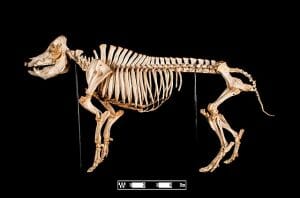Maceration Definition
Maceration is, generally, to soften by soaking in a liquid. In biology, maceration is used to describe multiple actions. One definition of maceration is the breakdown of food into chyme during digestion. Skin maceration, or pruning, is the softening and breaking down of skin from being exposed to too much moisture. The word maceration is also used to describe the preparation of skeletal specimens, such as those on display at natural history museums.
Examples of Maceration
Maceration During Digestion
During digestion, the stomach breaks down food into chyme through the process of maceration. Chyme is semi-digested food that is partially liquid. It is produced from a bolus, which is a mixture of food that has just been consumed and saliva. When the bolus travels to the stomach, the stomach secretes hydrochloric acid and digestive enzymes to break it down into chyme. This process can take from 40 minutes to a few hours. Chyme is very acidic, since it soaks in hydrochloric acid in the stomach. It then travels through the small and large intestines, where its pH is raised to neutral (around 7) and the nutrients it contains from food are absorbed into the body. When liquid is absorbed from chyme, it becomes feces, which are then excreted from the body.
Skin Maceration
Skin becomes macerated when it is exposed to moisture for too long, a condition known as hyperhydration. During maceration, the skin softens, breaks down, and becomes wrinkled and lighter in color. Skin maceration often happens when a bandage is applied to a wound because moisture from sweat remains in contact with the skin under the bandage. It can also occur when a person wears latex gloves that do not allow moisture to breathe, or from soaking in a bath for a while. Skin quickly returns to normal once it is allowed to dry, but skin that is macerated for a long time, such as skin under a bandage for an extended period, can be prone to infection.
The term maceration is also used when describing the skin of stillborn infants. A stillbirth occurs if a fetus dies in the womb starting at around 20 weeks of pregnancy; there are many possible causes such as infection, umbilical cord entanglement, or birth defects. When a fetus dies in the womb, its skin becomes macerated, which causes changes in physical appearance. The appearance of skin maceration in a stillborn infant is used to determine the approximate time of death. If the infant was dead in the womb for several days, the skin may have changed color and begun to peel due to maceration from soaking in the womb along with digestive enzymes that have begun to act upon the dead tissue. These changes in appearance can be very upsetting for the parents of a stillborn infant, especially if they do not understand why the changes have taken place.
Maceration of Skeletons
Maceration is used to clean animal skeletons for display purposes. The carcass is first skinned and its organs are removed. Then, it is placed inside a closed container with water (and sometimes washing powder/detergent) and left to decompose, usually at temperatures between 35-50°C (95-122°F). When decomposition occurs, the cells of the carcass are broken down by bacteria which have proliferated after the animal’s death. This process of breaking down the cells is maceration. Eventually, all the tissue of the carcass will have separated from the bones. In an animal the size of a dog, the process will take around 10 days. Maceration is often used to clean bones of specimens that go on display in museums, but it is also used in forensic anthropology on the remains of badly decomposed human victims to determine more clearly what injuries occurred or what type of weapon was used. Maceration is not used with fish or very small animals because their bones can fall apart easily; instead, Dermestes beetles are used to clean the carcass by scavenging its tissue.
This is a wild boar skeleton that was prepared by maceration. It is on display at the Museum of Veterinary Anatomy FMVZ USP in Brazil.
Related Biology Terms
- Chyme – Acidic, semiliquid, partially digested food.
- Bolus – A mixture of food and saliva that travels to the stomach, where it becomes chyme.
- Stillbirth – A fetus that dies in the womb starting at around 20 weeks of gestation; occurs in 1 out of 45 births worldwide.
- Decomposition – A state of decay in which organic material is broken down.
Quiz
1. Which would NOT be considered maceration?
A. The softening of skin when it is exposed to too much moisture
B. The breakdown of food by chewing
C. The breakdown of food into chyme
D. The decomposition of tissues in water, leaving just a skeleton
2. Under what conditions does skin maceration occur?
A. When skin is exposed to too much moisture.
B. When skin is not exposed to enough moisture, and dries out.
C. When skin is exposed to an acidic pH.
D. When skin is exposed to rapid changes in temperature.
3. What other term is “proud flesh” known as?
A. Hypergranulation
B. Hyperplasia of granulation
C. Exuberant granulation
D. All of the above

